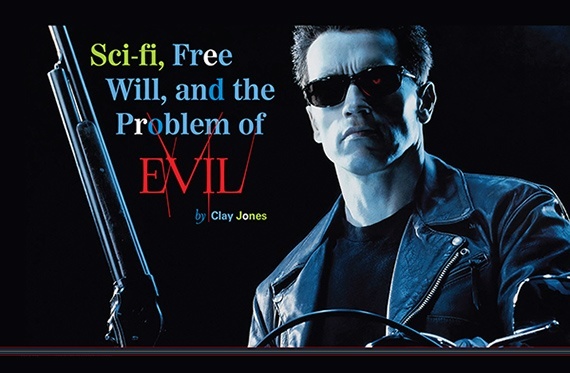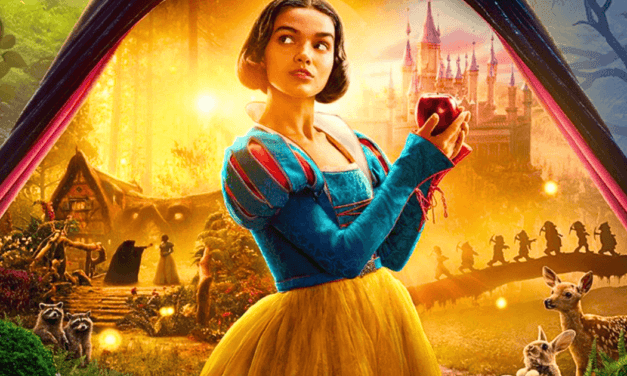This article first appeared in the CHRISTIAN RESEARCH JOURNAL, volume 35, number 05 (2012). The full text of this article in PDF format can be obtained by clicking here. For further information about the CHRISTIAN RESEARCH JOURNAL, click here.
In teaching every semester on why God allows evil, I’ve learned that many Christians do not understand the nature or value of free will. Indeed, many years ago I too struggled with what free will is all about, but found an unlikely ally in science fiction. Sci-fi books, movies, and television programs frequently feature free will as a major theme and thus help illumine this abstract topic.
Since many more people see science fiction on big and small screens than read sci-fi books, I will use only examples from movies and television where these themes are staples of the sci-fi genre.1 Most of these shows did very well at the box office or in TV ratings, and were very well received by critics; many also spawned popular video games.
Movies and television shows develop this subject partially because free-will science fiction resonates with themes much larger than most people imagine:2 the very nature of humankind, and, indeed, why God allows evil.
ALIENS THREATEN HUMAN FREE WILL
Some movies depict alien beings that intend to take away human free will, with most of the movie being about thwarting their attempt. For example, we find this plot in the 1956 classic Invasion of the Body Snatchers, and its three remakes.3 In the original, mysterious pods arrive from outer space, and while people sleep, an organism replicates them as emotionless “pod people.” Although physically identical, pod people no longer possess free will, but are part of a collective. The movie largely consists of a couple doing everything possible to avoid being infected. One pod person tells a terrified hostage, “Love, desire, ambition, faith— without them life’s so easy.” But the heroine protests, “I don’t want a world without love or grief or beauty.” The heroine believed that a world that included grief was preferable over a world where no one ever felt anything at all.
Similarly, aliens called the “Borg” in certain episodes of the Star Trek franchise also attempt to turn people into obedient drones. The Borg’s byline is, “Resistance is futile: you will be assimilated.” The Enterprise crew does everything in its power to resist and destroy the Borg because no one wants to lose their free will.
In science fiction, free will is always portrayed as extremely valuable and essential to being human. In fact, sci-fi always glorifies the fight to preserve free will at any cost.
HUMAN CREATIONS GAIN FREE WILL
Plotlines involving human creations gaining free will go in one of two directions. In one plotline, the creation rebels against the creator to rule humans.
The Terminator (1984) made Arnold Schwarzenegger a household name and represents another type of free-will plotline: humans create a computer that gains free will and turns on its creators.4 In The Terminator’s dystopian future, the U. S. military built a defense system called Skynet that, just a few weeks after being brought online, became self-aware. When the operators realized that Skynet was now thinking on its own, they tried to shut it down, but recognizing the threat, Skynet regarded humans as hostile to its existence so it thwarted their attempts and then sought to destroy them.
Similarly, the critically acclaimed film, The Matrix (1999), is about an artificial intelligence that “spawned an entire race of machines.” These machines keep humankind in suspended animation to harvest their bioelectrical energy, feeding them computer-generated dreams to keep them under control. But gradually a computer programmer named Neo (Keanu Reeves) learns the truth and is invited to join a small group of people in rebellion against the machines. The non-dream- world reality is bleak, but Neo prefers knowing the truth because, as he tells Morpheus (Laurence Fishburne), “I don’t like the idea that I’m not in control of my life.” So in The Matrix, not only do humans create a machine with free will, but then the machine threatens human free will.5
In The Terminator, The Matrix, and similar films,6 the creation of a computer that somehow obtains free will results in rebellion against its creator who it regards as a threat that needs to be enslaved or destroyed. Humans then spend the rest of the movie trying to destroy the computer. This resonates with us because it echoes the sweep of biblical history: God creates man but man uses his free will to rebel against God and seeks to destroy Him. Unlike most sci-fi, however, God seeks to restore relationship with His rebellious creations.
In the other plotline, humans create androids7 that gain free will, but these creations rightly rebel because their creators are unjust.
Most critics laude Blade Runner (1984) as one of the best science-fiction movies of all time.8 In fact, Time magazine ranks it in their best one hundred movies of all time.9 In Blade Runner, androids, called “replicants” or the derogatory “skin jobs,” rebel against their harsh enslavement. These rebels must be “retired” by blade runners. The problem is that the replicants were implanted with memories of growing up, and somehow this resulted in their gaining emotions and the ability to make real choices. As the movie progresses, blade runner Rick Deckard (Harrison Ford) begins to realize that some of these replicants not only possess free will, but exhibit real emotions and care for each other.
Although in Blade Runner there is the android-rebels-against-creator theme, what’s most interesting is its examination of what it means to be human. The movie explains that the replicants are human in almost every way; as they gained more life experiences, they developed their own “emotional responses—hate, love, fear, anger, envy,” which made them dangerous. Thus their creator built in “a fail safe device” that limited their lifespans to only four years. Angry about his four-year lifespan, a rebel replicant named Roy Batty (Rutger Hauer) kills his creator, thus freeing himself from his god. Later, in a Christ-type scene, Batty drives a nail through his own hand, and ultimately spares Deckard’s life because Batty has realized the significance of life itself. In fact, as Batty dies he releases a white dove that he had been holding. In the original version of Blade Runner,10 Deckard ultimately runs off with a replicant named Rachael (Sean Young) who has an indeterminate lifespan.
Brian Stableford wrote that sci-fi “writers almost invariably take the side of the androids against their human masters,”11 and this is certainly the case for Blade Runner where the replicants are portrayed as having more humanity than their human creators. Thus, in Blade Runner one can hear the perennial skeptics’ grouse: if there is a “Creator,” He asks too much of us, so our rebellion is warranted.
HUMANS REJECT SCRIPTED BLISS FOR FREE WILL
In Pleasantville (1998), modern-day high school siblings David (Tobey Maguire) and Jennifer (Reese Witherspoon) are transported into David’s favorite 1958 black and white, Leave it to Beaver-like TV show, Pleasantville, where they are astonished to find that they must pretend to be two of the show’s main characters, Bud and Mary Sue Parker. David tells Jennifer that they must stay “in character,” but Jennifer soon has sex with a boy who didn’t even know there was such a thing. He immediately changes from black and white into color. In fact, at lover’s lane a bright-red apple hangs from a black and white tree. Slowly, as citizens reject their scripted lifestyles and indulge different passions, they, and even various aspects of their surroundings, change from black and white into color. Of course, stodgy members of the town resist these changes as destructive to Pleasantville’s moral values and they remain black and white for a while, but the apple has been eaten—by the film’s end everything and everyone is now in vivid Technicolor. Although along with these unleashed passions the town now also knows racism, riots, and adultery, the author’s perspective is unmistakably clear: the freedom to indulge passion is preferable over a scripted/determined existence—even if that freedom results in suffering.
In The Adjustment Bureau (2011), the Bureau is an otherworldly organization charged with keeping “The Chairman’s” plan. But one day Bureau member Harry (Anthony Mackie) falls asleep and so fails to spill coffee on former Congressman David Norris (Matt Damon) at an appointed time. This allows David to again meet a woman named Elise (Emily Blunt) that he was not supposed to meet again because The Chairman knows they would fall in love and thus ruin his future plans, which include fulfilling their lifelong dreams. Soon the Bureau abducts David and warns him that he may not be with Elise, ever, or his brain will be “reset” (lobotomized). Nonetheless, David replies, “All I have are the choices that I make, and I choose her, come what may.” The film concludes with David and Elise cornered on a skyscraper rooftop. Instead of them both being reset, however, Harry explains that since both David and Elise “risked everything” to be with each other, The Chairman was “impressed” and decided to let them be together after all— their future is now up to them.
The ultimate lesson in both Pleasantville and The Adjustment Bureau is that free will is preferable even in the face of suffering. In fact, I have never known any science fiction ever to conclude, regardless of how much suffering ensues, that we humans would be better off without free will.
HUMANS DENY OTHER BEINGS’ FREE WILL
Another plot device involves humans replacing or removing other humans whose use of free will displeases them. In The Stepford Wives, set in the fictitious town of Stepford, Connecticut, the men murder their free-thinking, opinionated wives and replace them with submissive gynoids12 that will do their bidding. In the 1975 original, Joanna (Katherine Ross) suffered this fate.
The 2004 remake ends differently. The men implanted microchips into their wives’ brains to control them and replaced body parts with better, nonorganic parts. But the husband of Joanna (Nicole Kidman) refused to implant the controlling microchip into her because he wanted a real person with free will as a wife, a person whose professions of love had meaning. Although the remake lacked the intensity of the original, it did get one thing right: no healthy man or woman would really want a robot spouse.13 After all, for all the problems that free-willed spouses can cause, certainly they are superior to the best robot imaginable. Indeed, isn’t a robot spouse just three steps above inflatable?
Although sci-fi always represents humans as valuing their own free will, these sci-fi plotlines rightfully depict that humans often would rather not put up with other people’s free will. After all, beings with free will can be troublesome (or worse!), but doesn’t this also speak to the greatness of God that He patiently endures His creation’s rebellion?
THE ULTIMATE METANARRATIVE
None of these shows ultimately display a completely Christian theology, but parts of them ring true. That’s why many people are drawn to and fascinated by these free-will shows. And why shouldn’t they be? After all, if Christianity is true, then God did create free beings, both angels and humans, so it would make sense that our very nature would resonate with creation’s ultimate metanarrative. It is no surprise, then, that these plots would recognize that free will is valuable; essential to being human; worth fighting for; and even though it causes hardship, suffering, and grief, it is still preferable to a blissful existence that excludes being able to make significant moral choices. In these ways science fiction helps explain what life is about.
Clay Jones is associate professor in the master of arts in Christian apologetics program at Biola University and specializes in issues related to why God allows evil. Some of his most recent reflections can be found at www.clayjones.net.
NOTES
- Some of these films I saw as a younger Christian, and some of those I would not have a clear conscience about watching now (at least uncut).
- Of course, many other themes are involved in these movies and the writer’s primary intent may not have been to write about free will, self-awareness, or individuality.
- Invasion of the Body Snatchers (1956), Invasion of the Body Snatchers (1978), Body Snatchers (1993), The Invasion (2007).
- There have also been three more films: Terminator 2: Judgment Day (1991), Terminator 3: Rise of the Machines (2003), Terminator Salvation (2009), and a TV series, Terminator: The Sarah Connor Chronicles (2007–2009).
- There were two more films: The Matrix Reloaded and The Matrix Revolutions (both 2003).
- 2001: A Space Odyssey (1968), I, Robot (2004), Eagle Eye (2008), etc.
- Android: “An artificial being that resembles a human in form, especially one that is made of flesh-like material (as opposed to metal or plastic).” Jeff Prucher, ed., Brave New Words: The Oxford Dictionary of Science Fiction (Oxford: Oxford University Press, 2007), 6.
- The American Film Institute lists it as one of the Top Ten Sci-fi films of all time. http://www.afi.com/10top10/moviedetail.aspx?id=14.
- Richard Corliss and Richard Schickel, “All-TIME 100 Movies,” Time, January 23, 2012, http://entertainment.time.com/2005/02/12/all-time-100-movies/#blade-runner-1982.
- There’s an editor’s edition.
- Brian Stableford, The Encyclopedia of Science Fiction, ed. John Clute and Peter Nichols (New York: St. Martin’s Griffin, 1995), 34. Similarly in Screamers (1995), an android gives her life for a corrupt human.
- Gynoid is the female for android, which can be generic or masculine.
- The film also spawned TV spinoffs The Revenge of the Stepford Wives (1980), The Stepford Children (1987), and The Stepford Husbands (1996).










